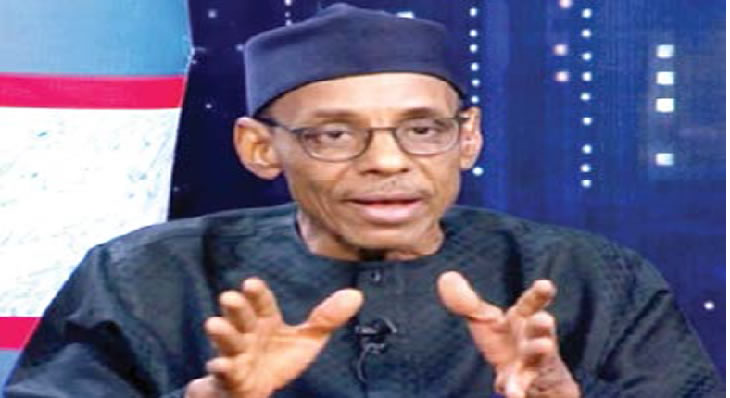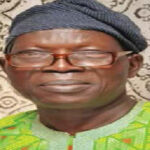
The spokesperson for the Northern Elders Forum, Dr Hakeem Baba-Ahmed, speaks to DANIEL AYANTOYE about his assessment of the elections, governance and the incoming government
What’s your assessment of the outcome of the elections?
Like all responsible Nigerians, the Northern Elders Forum is watching developments very closely. We have our worries and concerns. If you have noticed, we kept silent over all the issues from the elections because we believe what we owe the nation at this stage is to be responsible in terms of what we say.
Before the election, you said there was no reason to doubt the Independent National Electoral Commission, how would you assess the commission’s performance?
The many occasions that we said we had confidence in INEC, its leadership and processes were informed by what we saw as genuine improvement in technology, processes and its willingness to take on major challenges in the electoral process. But we have no regret over that; at the time we made those statements, it was clear to us that INEC had recorded major improvements and the Electoral Act had addressed a number of key issues. I don’t think INEC itself will tell you that it is entirely satisfied with its performance in the both elections. I think if INEC is fair to itself and to the nation, it will own up to the fact that it had serious problems with the presidential election and commit to examine it and allow a thorough interrogation of that process. I know some will be addressed in court but INEC needs to admit to Nigerians that it had problems particularly at those critical hours when it failed to show Nigerians what it promised. I think we should recognise that INEC is an institution that naturally attracts a huge expectation from Nigerians, and it must deliver as much as it promises.
Even if INEC continues to improve, do you think INEC can ever meet Nigerians’ expectations?
There is no perfect election but you can make it near perfect as much as possible. An election can be made credible and free and fair. I think we need to recognise the fact that INEC is only one element in the requirement for credible free and fair elections. If one wants to be fair to INEC; there is a huge amount of responsibility for a credible election that is not on INEC. The political environment and the process are also determinants of electoral success. Politicians want to win elections but they are very eager to poison every element of that process. Violence, introduction of several issues such as ethnicity and tribalism are factors that politicians are responsible for. INEC can’t conduct an election as well as sanitise the political environment. There are provisions in the electoral law dealing with things like vote-buying, violence and intimidation, these should not be the responsibility of INEC. To your question whether INEC can ever deliver a credible election? The question should be if Nigerians are willing to have a credible election. So it’s a Nigerian problem, INEC can improve its processes but can Nigerians allow for a credible election?
Based on the reservations people have with the conduct of the election, many candidates may end up in court, should we applaud?
I know that every element will be interrogated by the court. At this stage, I will say it’s a good thing to open it up, and no one should stand in the way of those who feel aggrieved. It’s a good thing that people are going to the court, What is important is to remind the judiciary that they have to live up to their duties. It is absolutely important because the judiciary has to be responsible, impartial in the manner it listens to complaints and examines it. What is wrong in going to court is when before you go to court you are sure you will not get justice. Let’s be reminded that close to 70 per cent of our elections end up being decided by the court. That is not good for the electoral process. The court ends up being the one to tell Nigerians who our leaders are. It tells you we have a terrible ruling class that corrupts the electoral process and decides that if they lose, they will go to court. Then, they try to corrupt the judiciary. Why can’t we have an election where the rules and guidelines are very clear, the umpire is transparently honest and competent enough to conduct an election and 80 per cent of Nigerians accept the outcome and we move on? I am worried about the burden we are placing on our judiciary now, the judiciary needs to be reminded that Nigerians have huge expectations from them. They can make the difference on whether or not our democracy survives. What the politicians have done, in terms of poisoning the election environment and the political process, is the introduction of ethnicity, religion, violence, vote-buying and every negative element that affects the electoral process. These things were multiplied ten times during this election. So far, we didn’t move forward, we took many steps backward and disappointed ourselves.
Some of the candidates are at the tribunal with different prayers, what are your expectations, based on previous exercises?
I think a lot of politicians are just going to waste more of their money. There are many of them who know they have lost fair and square but it has become a Nigerian tradition that almost every politician who loses an election must go to court. Another thing is that we are creating a kind of situation that will increase corruption in the judiciary and it is putting an unfair burden on them, they shouldn’t be in a position where they will have to decide 60 or 70 per cent of who should be our next set of leaders. I know that the judiciary has a mandate to adjudicate in cases arising from the electoral process, but for goodness sake, the judiciary is made up of Nigerians and people now take all their weak and corrupted values to these judges and want them to decide who is right or wrong. The kind of democracy we are running requires a very critical scrutiny. Is it working for us? Do we have the right attitude? Sociologists will find a serious task handling our value system and how it affects our democratic process. If we have to continue operating the democratic process, we need to get very serious about fixing it otherwise one day we will have an election that will put an end to this country.
The election followed tribal and religious lines, what do you think is the implication for the President-elect, Asiwaju Bola Tinubu, when he is sworn in?
These are two factors that have sadly assumed a dimension that is very worrisome. You know when somebody is being told that you can’t vote because you are not from a particular tribe, or people are beaten up for voting a particular candidate, then we have every reason to be worried. I don’t know what Lagos will look like after the general elections. I think whoever takes over from President Muhammadu Buhari has serious work to do. We lived in peace for several years and we can’t become enemies suddenly because of elections. It is wrong. It is retrogressive. We should build a Nigeria of citizens not a country of tribes, not a Nigeria of Muslims or Christians but a country where the citizens can feel free to sleep comfortably and safe as well as exercise their rights irrespective of where a person comes from or their faith. But we can come to the table and ask why we can’t get the election right. How is it just possible that we can’t simply agree like in football; you score 1-0 at the end of the match you have won and everybody agrees. There must be something wrong and I believe there must be something we can do to fix it.
The race for the senate presidency has commenced, even though the governing All Progressive Congress, which has the majority in both National Assembly chambers has yet to decide on the sharing formula, which region do you think should produce the senate president and Speaker of the House of Representatives?
We should leave the legislators to decide on that and not impose it on them. I don’t want to enter the argument on which zone should produce what because this is what has brought us to where we are now; on faith and tribal sentiments. The more we do this, the more we cheapen public offices. We must move beyond this.
The Senate Chief Whip, Orji Uzor Kalu, from the South-East and a northerner, Senator Jibrin Barau, have indicated interest. Some people have said the South-East should be compensated with the senate presidency for a balance. What do you think?
What do they mean by compensation? What does the South-East lose that they want to be compensated with one individual for a position that is not likely to be of benefit to the South-East?
Few days ago, the President signed into law the bills that allow states to licence, generate, transmit and distribute electricity as well as judiciary and legislative independence, what’s your take on this?
These are matters that should have been settled a long time ago, there is no reason why a state should not generate its electricity. None at all. God has blessed this country with all sources of power and we shouldn’t even just stop here, there are all other things that the constitution allocates to the center that should be devolved to the states. I hope the next administration after President Buhari would find a way of getting Nigeria to discuss the structure and operation of our federal system. It is a very important issue.
Some state governments rejected autonomy for the judiciary and local governments, what’s your take on that?
I think since 1999, the operation of our constitution has created monsters out of our governors. They have become serious problems. They have assumed powers and influence far beyond what the constitution provides. The presidential system has accrued too much of powers on the president and governors and it is important for us to begin to interrogate if this is actually a good thing for us in this country. If a governor, others who already has the state legislature in his pocket can determine what element of the constitution they approve and what not to approve, that shows there is trouble. How a President would simply decide which bill to sign and what not to sign after so much debate by the National Assembly, state Assemblies and still pass through the governors is interesting. Something is wrong with the presidential system and we need to ask if we should really continue with this system. Is it serving our interest? How can the President and the 36 governors, including the FCT minister; that is 37 Nigerians, have such an awesome power to decide what happens to us? It is a very serious issue and it must be addressed.
Many people have faulted the timing of the naira redesign policy, what are your thoughts on the hardship it has inflicted on Nigerians?
President Buhari is in charge until May 29 and he can exercise those powers till then. However, I think the President recognised that he has made a serious blunder, particularly his seeming disregard for the law and the flippant manner he is approaching the hardship and difficulty that he has imposed on Nigerians. I think of all the legacies Buhari will leave behind, it is the memory of the misery and the hardship he has placed on Nigerians that stands out because of a policy that will not work, cannot work and is likely to be revised because it was badly conceived and badly implemented without any consideration to its efficacy, flexibility or utility. I think history is not going to be kind to Buhari over the issue of the new naira. But the worst part of what he has done is the complete disregard for public opinion, the sentiment of the sufferings of the people, and his contempt for the judicial process.
It was argued that the new naira policy will erase vote-buying, do you think this was achieved?
I was reading recently that the President said it reduced vote-buying, he must be living in his own world because I have never seen an election where vote-buying was highly practiced like this election. People had their votes bought right under the nose of security officials with small amounts of money. So, if the naira redesign was to address vote-buying, it is the biggest failure. People’s lives have been so miserable because of the policy. It has deprived people access to their legitimate money that people were willing to sell their votes for N200 and a plate of rice and if anybody is telling him he has succeeded in reducing vote-buying, they are deceiving him. He is counting days he will be leaving and I think the country is also waiting to see him leave.
What do you think should be the president-elect’s focus and achievement in his early days in office?
I think the president-elect should focus on winning his case in court that he was legitimately elected. He should speak the language of reconciliation. Whoever is the President after May 29 should focus on bridging the inter-communal relation which has occurred as a result of bad, poisonous politicking that has been the context for this election.
The Northern Elders Forum engaged some presidential candidates, including Tinubu, before the election, what are your expectations from him?
I would rather reserve my comment about any of the contestants whether Tinubu or those in court challenging the process until the court finally says who is going to be the President. However, we will hold the next president accountable. We are hoping the next president will be sensitive to the needs of the people; someone who will work very hard to the expectation of Nigerian citizens. We are tired of criticising, the NEF is a forum of elderly people, we are looking up to the day when we will say to the President in this country, God bless you, a day we will knock on the door of the president and tell him, you are doing well.
Why do you think the President didn’t meet such expectation, because he had enviable goodwill when he came into office?
I am tired of talking about President Buhari. What I will tell you is that the same way President Buhari will say he is tired, many Nigerians will tell you they are tired of him. I think enough damage has been done in the last eight years. The good thing is to see him go and for us to welcome another President.





